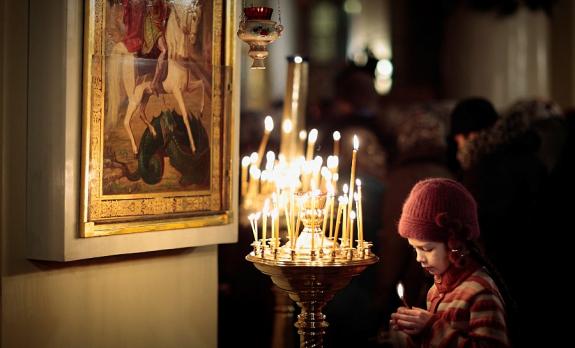In Russian tradition a church service was called a supplication. It is obvious that a conversation with God was perceived as a fervent invocation to the Personality of the Creator. A person asks God all the time and at all stages: they need to improve their health, to get money to feed their family, to see their sins, and to find hope for the salvation of their soul. Although there are also thanksgiving and praise prayers, in which a Christian sincerely admires the Creator. A prayer can be called the first sacrament, because in the strict sense a sacrament is everything from the Divine world, which has no human explanation, but becomes an instrument of communicating grace to us.
And every church sacrament begins with a prayer. We ask God every time for our outward action to be filled with the Holy Spirit and conveyed in grace to us. A prayer is unique in that it is available to anyone. It is not necessary to remind about the famous “pray without ceasing” (1 Thessalonians 5:17) and 243 other Scripture references to a prayer. We just need to do it.
Theophylact of Ohrid calls a prayer the first act of faith in one of his interpretations. Alas, even in Orthodox environment, prayer and labor get unjustly separated more often. If prayer is not labor, then what is it? Is it idleness, leisure, or a hobby? One priest’s wife once told me with irony, seeing a believer hesitating after reading 40 canons of the Saint in supplication for his need, “Admit it, it is easier to chop wood than to pray?” And we really get tired after a service, and even after a prayer rule. At least we make an effort to bring ourselves to stand before His image, to open the book, to harness all the attention and willpower, and then to keep some tension throughout the whole process. Note that it is much easier to read an ordinary book. It turns out that prayer is true labor.
Through prayer we talk to God, that is, we establish a contact. In this contact there is a kind of connection between our personal inner world with all the problems and soul’s ailments, on the one hand, and the Lord with His majesty and purity, on the other hand. Need I recall how our state changes after a divine service or after a personal prayer? Yes, everyone has their own experience of events that happen after prayer, when circumstances suddenly turn out to be in our favor. And it seems like a thunderstorm did not strike, but the situation got resolved. We could have once thought it to be only a coincidence due to weak faith. However, in fact, we were helped by our best Friend, Whom we should only ask and He will definitely come to our rescue.
Need I say that prayer changes a person? We have repeatedly heard stories about cases of miraculous healing of people from incurable diseases, as well as witnessed other unusual stories from believers. People’s lives changed for the better by their prayers. However, that did not happen overnight, but generally after a long period of trials. Why is that? Trials became a catalyst that triggered a search inside a person for a way out of a situation, together with God. Prayer always changes our inner state, clears our thoughts, sets our mind straight, calms us down, and allows us to look at the situation in a different way. It is here, where a person’s spiritual growth and their path to God started. A person started changing and acquiring faith primarily due to an important activity: a conversation with God.
The reality of a person always changed gradually in such situations. Yet, it all began with prayer. With it we can calm down, find hope for a solution, and hear God. “And whatever things you ask in a prayer, believing, you will receive” (Matthew 21:22). That is, Christ plainly tells us that we are able to change our reality with His help.
From there it is pointless to talk, it is necessary to accomplish the most difficult thing: to act. To get up for prayer, to create a regular routine, to learn to focus on words, to put thoughts and willpower into the text, to be able to hear the silent voice of God in our hearts. The problem of our time is the departure from praying. The Church ceases to be such if it gives up the communication with God through conversation with Him. After all, do we participate in regular briefings and meetings at work to agree on certain points, to improve relations between departments, and to get feedback? By this clumsy example, the importance of communication with God can be shown. In the end only He knows what the good and the right is for each of us. So, we need to constantly ask Him for advice and consult with Him, thereby we have a chance to continue on the right path and to change our lives in the right direction.
The only thing to do is to start. God is more real than we think He is. Let Him into your life, fill your day with prayer, and choose to change your reality together with the Creator right now!
Translated by Julia Frolova

















